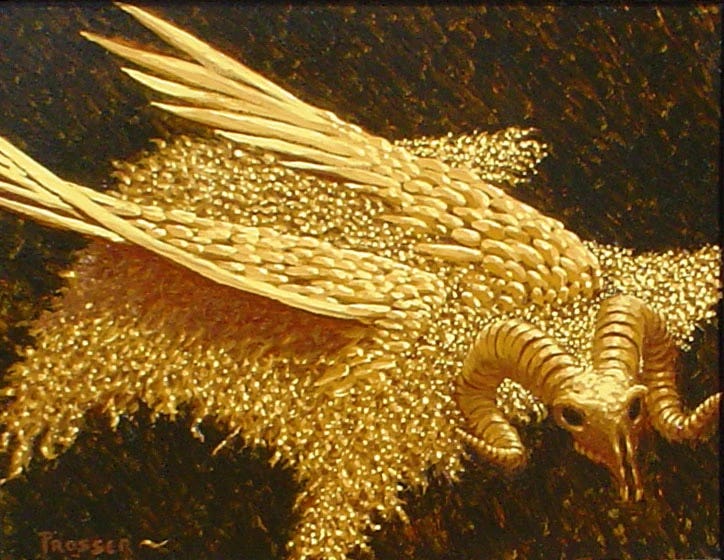Hello, I’m Kate Farrell, author of The Fairy Tale Heroine, your guide as we explore the hidden terrain of the heroine’s unique quest—how it can empower your life and inspire your creative work.
As a lifelong storyteller, I discovered that the age-old, foundational folk and fairy tales of the heroine’s journey had survived by word of mouth over millennia, often from matriarchal cultures.
In the previous episode, we followed the heroine as she journeyed into the treacherous forest. We discovered her heroic, archetypal tasks—ones she must accomplish—do or die. Baba Yaga challenged Vasilisa to separate grains and seeds in rapid fashion, impossible to do.
In this episode, we meet an even more ancient heroine from the myths of ancient Greece, a mortal princess named Psyche who is challenged by the goddess, Aphrodite, to complete four impossible tasks. You might be surprised that the first one is similar to that given by Baba Yaga.
As you listen to this much abbreviated version of the Greek myth, consider the meaning of the first two tasks Psyche is given by Aphrodite.
The Myth: “Psyche and Eros”
Long ago, in ancient Greece, there lived a princess named Psyche.
As Psyche grew into a young maid, all praised her beauty—which they said words could not describe. People in her mountain kingdom began to worship her, calling her the new goddess of love, born of the Earth.
They neglected the temples and love cushions of Aphrodite the Olympian goddess of love—that stunning beauty born of the sea.
Always a vain and jealous goddess, Aphrodite was outraged! “The nerve—a mere mortal maid, a virgin! Who does this girl think she is?”
Aphrodite plotted her revenge. She sent her winged son, Eros, to strike Psyche with one of his love arrows and cause her to fall in love with a miserable brute of man who would beat her into an early death.
But when Eros flew to her and looked on her, he wanted her for himself. He lured Psyche to a magical palace and came to her in the dark of night, unseen, as her secret husband.
Psyche's love was blind until she lit an oil lamp while he slept and saw his wings and knew he was Eros, the son of Aphrodite.
When a drop of hot oil fell on his shoulder, Eros startled and flew away to his mother’s Olympian home, leaving Psyche alone as the magical palace disappeared around her.
Abandoned, pregnant with the god’s child, Psyche fled for her life, fearing the wrath of Aphrodite.
But she knew there was really no place to hide, so she climbed Mount Olympus to turn herself in—hoping for mercy.
Aphrodite showed none, but flew at her, ripping her clothes to shreds, tearing out her hair in clumps, calling her a slut.
She threw Psyche into a granary shed where there was a huge heap of grains all mixed together: wheat, barley, poppy seed, and millet. She told Psyche to sort them into their separate piles by evening, as she loved her life.
Psyche fell to the floor, bruised and battered, weeping. Swarms of tiny ants noticed her and took pity on her, separating all the grain into distinct heaps by evening.
It was the first of four impossible labors—do or die.
The next morning Psyche was given the dangerous task of gathering precious wool from the fierce, golden rams. She despaired, watching them butt and fight in their pasture, but grassy reeds along a stream spoke to her and told her of the afternoon doze of the rams. Gathering their wool from the nearby briar branches would be easy then. Psyche waited by the stream and gathered large quantities of the golden fleece as the rams slept.
Furious at her success, Aphrodite gave Psyche a little jar made of polished crystal and told her to fill it with water from the source of the River Styx on a high mountain. This path was steep, slippery, and crawling with dragons with unblinking eyes. Psyche prepared for her death, but an eagle snatched the jar and zigzagged, flying through the dragons, filling it with water for Psyche.
Aphrodite called her a witch and then demanded she descend to the dreaded underworld to obtain a portion of beauty from Persephone, the Queen of the Dead.
With the advice of a tower she succeeded, married Eros, and took her place among the archetypal goddesses of Aphrodite, Demeter, Hera, and Persephone. Psyche soon gave birth to a baby girl whom she named Bliss.
Always pictured at the end with the delicate wings of a butterfly, transformation was Psyche’s quest.
Reflections
Why is Aphrodite jealous of Psyche; what is the nature of their conflict?
What is the meaning of sorting the grains, both in the Greek myth and the Slavic fairy tale?
What is the importance of gathering a portion of the golden fleece to the heroine?
Continue and read my personal story of the golden fleece: how I translated the elemental task of this tale to true events of the 1960s as I came of age—not knowing its relevance at the time.
Personal Story: Free Wheeling Bikers, 1960s
In 1963, at the start of a turbulent decade in the City, I graduated from San Francisco State with a BA in English Literature, found a job downtown, and rented an apartment.
There, in my lower Pacific Heights neighborhood, I met a truckdriver named Jack, a muscular guy with long, black hair and a flashing grin. It was during my friendship with Jack who rode a Harley Davidson that I came to know the hill climbs.
On some weekends I rode on the back of his Harley in the illegal Oakland Hill Climbs along with the Hell's Angels and other biker clubs like the Gypsy Jokers. Jack’s chopper was a “stripped hog”—a Harley without the chrome or muffler cover, a raw, loud machine. We joined the chaos of bikers revving up the hilly trails and speeding down the sides in zigzags, barely missing one another.
Competing leather jackets with their club logos, like the Hell’s Angels "death head," added color to the dusty scene. I was learning how it felt to be confrontational, angry.
One cold, winter afternoon returning from the hill climbs on the upper deck of the Bay Bridge, we rode at high speed with fast lane changes, weaving in and out of traffic, the wind whipping through my hair and thin jacket.
In the City, Jack came to a sudden stop at the top of a hill; his bike faltered on slick pavement and fell, trapping me underneath, burning my calf on the exposed, hot exhaust pipe. In my apartment, Jack treated the burn with a slab of butter. The next day he bought me a pair of tall, black leather boots.
Wearing those boots, I felt I could face the world—and anyone who’d dare me.
Reflections
How is this true story like Psyche gathering the golden fleece?
Why is it important for the heroine to learn assertiveness?
What is your golden fleece story? As you reflect on your life story, let the memories converge until you discover a time when you grabbed the golden fleece for yourself. It could be a time in the past or present, since we are “coming of age” throughout our lives in new cycles on our journeys.
I look forward to reading your comments and stories!
For more, join me in an online class in August:
Writing the Heroine Journey for Writers and Creatives
Two-Session Virtual Workshop, Online with Kate Farrell
Tuesdays 5:00pm – 7:00 pm/ PDT
August 5th & 12th
Cost: $100 for both sessions
Limited Enrollment
Join us for an enlightening summer tour on the fairy tale heroine’s journey as we explore two, short tales from Old Europe, “Mother Holle” and “Rumpelstiltskin,” and find hidden messages in their magical motifs.
Register here: https://woventales.net/online-classes/












Share this post